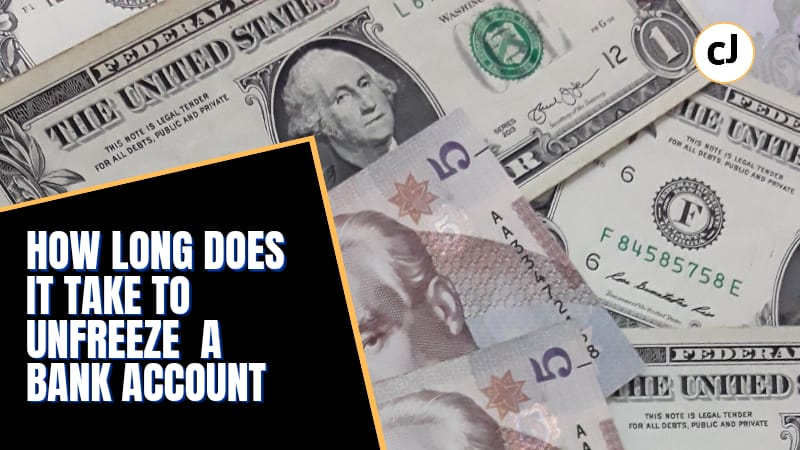Banks have a multitude of roles and responsibilities. They handle various financial transactions for the account holders and also monitor the accounts for suspicious activities. Banks have the authority to freeze an account if they notice anything different about the transactions with the account. Here is how you can unfreeze a bank account.
Even account holders can ask banks to freeze their accounts for a given duration. People do this when they travel to other countries for extended periods. Unfreezing a bank account can be simple or complicated, depending on why it was frozen.
Read to find out why banks freeze accounts, how long it takes to unfreeze them, and how to achieve it.
Quick Navigation
- How Soon Can You Unfreeze Your Bank Account?
- Why Do Bank Accounts Get Frozen?
- Can All Your Funds be Frozen?
- What Happens to a Frozen Bank Account?
- How to Unfreeze a Bank Account?
- Do You Need Legal Help to Unfreeze a Bank Account?
- Is a Frozen Account the Same as a Suspended Account?
- Is a Frozen Account the Same as a Closed Account?
- Conclusion
How Soon Can You Unfreeze Your Bank Account?

Well, unfreezing a bank account can take a day, ten business days, or more. If you ask the bank to temporarily freeze the account, the bank will unfreeze it in less time.
You have to contact the bank via phone or visit in person.
Some banks don’t accept phone requests and want to ensure that it is indeed the account holder asking to unfreeze the account. The bank will then process the request in a day or two.
However, if the bank froze your account due to red flags or suspicious activities, you should take the necessary steps to prove that the transactions are legal.
The bank will review the information and unfreeze the accounts in the next few business days. This can take bout ten days or a couple of weeks. Sometimes, it might take a month if the law is involved.
Why Do Bank Accounts Get Frozen?

Both customers and banks can freeze their bank accounts. Customers request to freeze the account in the following scenarios:
– Lost/ misplaced debit card
– Fear/ doubt of compromised account
– Going out of the country (and don’t intend to use the bank account during then)
Freezing the bank account in these instances will protect the funds from being stolen or misused. You can prevent transactions from happening without your knowledge.
That said, banks freeze accounts when they notice fraudulent or suspicious activities. They don’t need the account holder’s permission to freeze the account in such instances. A few reasons are:
– Bad checks
– Too many unpaid debts
– Irregular/ excess account activity
– Doubts about terrorism funding
– Doubts of money laundering
– Flagged for fraudulent transactions
– Administrative purposes
– To protect your account
– Contacted by a creditor to block funds
– Contacted by an investigative agency to freeze the account
The bank will investigate the cause of suspicion and decide the next course of action. If the bank’s internal investigation increases/ establishes their cause of concern, banks will inform the relevant government agencies to take over the case for a thorough investigation.
Banks might contact you for an explanation in some cases. If they find your answers satisfactory (and the investigation confirms it), the bank will unfreeze your account.
Can All Your Funds be Frozen?
No. All types of funds cannot be frozen, but most can. For example, salaries, dividends, interests, savings, trust funds, deposits, etc., can be frozen with the bank account.
Only the funds directly paid by the government (benefits like social security) deposited two months before the decision/ judgment cannot be frozen.
If you encashed the social security benefits but deposited the money to your account again, it may or may not be accessible after banks freeze your account.
Here, you have to remember that the value of social security funds is protected from freezing and not the amount itself.
For example, if you receive $1800 as social security benefits in the previous two months, the first $1800 in your account will be protected irrespective of what the source of the funds is.
Furthermore, the funds in joint accounts can also be frozen. If your partner has indulged in suspicious activity, even you will be blocked from accessing the account.
You cannot close a frozen bank account until the investigation is complete. The bank will act as per the judgment.
What Happens to a Frozen Bank Account?
A frozen bank account prevents you from accessing the funds in it. You cannot carry out any kind of transaction until the account is unfrozen.
In addition, you cannot deposit or withdraw money from a frozen bank account. You can also make payments, clear debts, or use the money as proof of security. The money in the account will continue to remain untouched until the next course of action is decided.
How to Unfreeze a Bank Account?

If your bank account is frozen, don’t panic and take drastic action. Talking to the bank authorities can be enough in some instances.
Find Out the Reason
Enquire why the bank had to freeze your account. If you already have an answer to their query, submit the information and wait for the bank to review it.
Submit Proof
The majority of banks err on the side of caution and temporarily freeze an account to avoid legal complications.
Banks are held responsible for failing to notice suspicious transactions if things go wrong. Show proof that everything is proper and legal, and banks will unfreeze your account.
Take Legal Advice
If you aren’t sure how to proceed, it is better to contact a financial legal advisor. If you have been inadvertently in a shady transaction and didn’t know of it until the bank froze your account, contact a lawyer for help.
File Bankruptcy
If your bank account was frozen due to unpaid debts (to the bank or other creditors who got the judgment), you can file a bankruptcy petition.
Though this won’t unfreeze the account, it can protect the funds for the time being. However, don’t try to withdraw or hide the funds, as it can affect your bankruptcy claim.
Vacating Judgment
Settle the debt with the creditor and come to a mutual agreement. Once done, the creditor will officially inform the bank, which will then proceed to unfreeze your account.
According to the frozen bank account laws, creditors are allowed to take all the money in your account if it pays their debt. Be careful with your finances.
Do You Need Legal Help to Unfreeze a Bank Account?
You don’t always need legal help to unfreeze a bank account. Ask the bank for a reason and decide accordingly. Why pay a lawyer fee when it’s a simple case of miscommunication or something you can sort on your own?
Is a Frozen Account the Same as a Suspended Account?
No. A frozen account is completely inaccessible for the account holder. You cannot perform any transaction. A suspended or restricted account might still allow a few transactions, though there will be strict limits on deposits and withdrawals.
However, both are temporary and can be reverted by the bank. Frozen and suspended accounts are closed when illegal activities are proven.
Is a Frozen Account the Same as a Closed Account?
No. A frozen account is not a closed account. It is temporarily inactive and can be reactivated, depending on the investigation. A closed account cannot be reopened or activated.
The best you can do is open a new account with the bank or another one. A closed account is permanent. The bank will inform you before closing the account.
Conclusion
Personal and business bank accounts can be frozen without prior intimation from the bank. Unfreezing a bank account can take a day or ten business days, depending on the reason for the initial action.
Don’t get into panic mode or pull your hair when your account is frozen. Talk to the bank first and then decide the best course of action.
We hope you have the necessary information about unfreezing your bank accounts. Let’s meet soon with another important topic.

